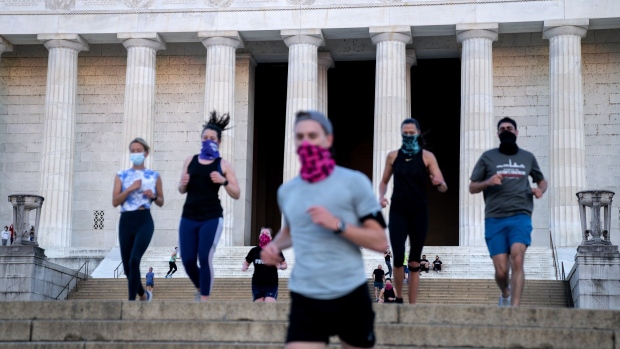Apr 27, 2021
Vaccinated Americans can go unmasked outdoors, gather indoors
, Bloomberg News

Fully-vaccinated Americans can be unmasked when exercising, dining and socializing outdoors in small groups, federal health officials said, and can gather indoors with other fully vaccinated people and family members without masks or social distancing.
But masks should remain on anywhere there’s a large gathering, including at ballparks, malls or church, the U.S. Centers for Disease Control and Prevention said on Tuesday. And the agency urged that vaccinated people be mindful around those with a higher risk for severe illness.
“Today is another day we can take a step back to the normalcy of before,” Rochelle Walensky, the CDC chief, said at a news briefing announcing the changes. She cited a “really hopeful decline” of about 21 per cent in the 7-day average for cases.
The new recommendations, which represent one of the most significant relaxations of guidelines since the pandemic began, are complex and wide-ranging. They come with almost 30 per cent of Americans fully inoculated and with increases starting to slow in the daily COVID-19 caseload. At the same time, the guidelines send a message that getting vaccinated offers a clear route to a more normal lifestyle at a time when a high percentage of Americans remain vaccine hesitant.
Under the new rules, fully vaccinated people can attend a small outdoor gathering maskless or dine at an outdoor restaurant with others, whether they’re fully vaccinated or not. They can also get together indoors with unvaccinated people of any age from one other household without masks or social distancing, according to the agency.
Additionally, inoculated Americans don’t need to be isolated or get tested if they’ve been around someone with COVID-19, unless they have symptoms. If so, get tested and stay home, the agency urges.
“Over the past year, we have spent a lot of time telling Americans what they cannot do, what they should not do,” Walensky said. “Today, I’m going to tell you some of the things you can do if you are fully vaccinated.“
But the guidance also includes some reservations.
The CDC urges all Americans to wear masks when attending medium or large-size gatherings, such as live performances or sporting events, and during visits to malls and full-capacity places of worship. And the agency encourages people to be mindful when around those with an increased risk for severe illness from COVID-19, including those with diabetes and some types of cancer, lung or kidney disease.
“You will still need to follow guidance at your workplace,” the CDC said, adding that the fully vaccinated “should continue to follow guidance to protect themselves and others, including wearing a well-fitted mask, when indoors or in an outdoor setting or venue where masks are required.”
You’re considered fully vaccinated two weeks after receiving the final vaccine dose of the two-dose vaccines made by Pfizer Inc.-BioNTech SE and Moderna Inc., or a single dose of the Johnson & Johnson vaccine.
It’s long been understood that indoor environments present the highest risk of virus transmission. SARS-CoV-2, the virus that causes COVID-19, spreads largely through aerosolized viral particles. The size of a space, how many people are in it, length of exposure and air circulation all factor into how easily viral particles might spread.
Infection odds
The odds of infection are much smaller in outdoor settings, but numerous factors, such as social distancing, vaccination status and duration of face-to-face exposure can play a role in determining the likelihood of transmission.
In recent weeks, a growing chorus of public-health advocates and medical experts have been calling for the U.S. to relax its rules on outdoor masking.
Earlier this month, the New England Journal of Medicine published a blog questioning whether it’s time to do away with such mandates written by Paul Sax, clinical director of the division of infectious diseases at Brigham and Women’s Hospital in Boston.
Follow the science
Former Food and Drug Administration Commissioner Scott Gottlieb wrote in an opinion piece in The Wall Street Journal on Monday that the Biden administration should end outdoor mask edicts.
“I think it’s best when public health mandates come out that they really follow the science,” he said. “Transmission doesn’t happen when people are outdoors by themselves walking around.” He still recommends wearing masks outdoors if you’re not vaccinated, having a face-to-face conversation with someone you don’t know, or in a crowded place.
“For awhile, the mask outdoors has been more a marker of supporting public health,” he said. “COVID isn’t going away any time soon, so we have to find ways we can live with it more easily. Not wearing masks when you are outdoors by yourself could be one thing that could help with that.”
However, other health experts say outdoor mask wearing can contribute to a sense of social solidarity in combating the virus, and are a visual reminder of the need for caution even as vaccinations increase and illness recedes.
“There’s no clear rule that can be applied,” said Krystal Pollitt, an assistant professor of epidemiology at the Yale School of Public Health. “There are so many things to take into consideration to best evaluate risk. We still need to be vigilant.”
--With assistance from Kristen V. Brown.


